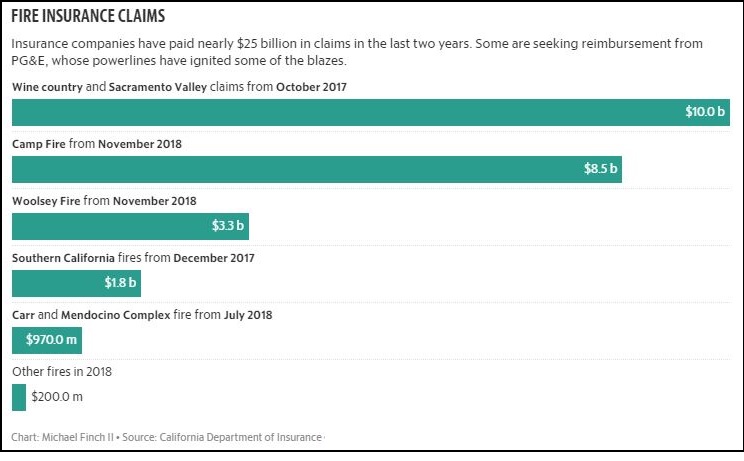
|
|

|
|
| April 20, 2024 |
|
California bans insurers from dropping customers in 2019 wildfire zones 
SACRAMENTO - California’s insurance commissioner, responding to a crisis that’s hit much of rural California, issued a one-year moratorium Thursday banning carriers from canceling homeowners’ coverage in areas struck by the 2019 wildfires.
The declaration by Commissioner Ricardo Lara affects about 800,000 homeowners living in and around the zones affected by 16 major fire emergencies this year, including the massive Kincade Fire in Sonoma County in October. The moratorium, which ends Dec. 5, 2020, “gives people time to plan, shop around,” Lara said in announcing the action at an event in Oakland. While the moratorium only covers homeowners who live in the vicinity of the 2019 fires, Lara also insurers to voluntarily refrain from canceling any homeowner who lives in a fire-prone area. The voluntary halt would also last a year. A state law that Lara authored while he was in the state Senate in 2018 gives him the authority to impose the mandatory moratorium. But the moratorium law, SB 824, only took effect in January and still leaves tens of thousands of mostly rural homeowners struggling with insurance cancellations following the horrific 2017 and 2018 wildfires. Homeowners who got canceled have told The Sacramento Bee that they’ve seen their insurance premiums double or triple, costing them thousands of dollars a year; the loss of coverage also has depressed housing markets in rural areas as potential homebuyers have shied away from making purchases. “It puts people in a crazy state of unknown,” said James Gore, a Sonoma County supervisor who accompanied Lara. He said as many as 140,000 homeowners in Sonoma face possible cancellations after the Kincade Fire. The fire burned 77,000 acres, destroyed hundreds of buildings and forced the evacuation of more than 190,000 residents. Insurance industry hit hard The insurance industry reacted warily to Lara’s announcement, and it wasn’t clear if insurers would agree to the commissioner’s request for a statewide voluntary halt on fire-related cancellations. Industry officials said the industry has had little choice but to cancel thousands of at-risk homeowners after paying out more than $24 billion in damage claims following the 2017 and 2018 fires. Merced Property & Casualty Co., a small 102-year-old insurer, was forced out of business barely a month after the Camp Fire, its $64 million in potential losses were so great. John Norwood, an insurance lobbyist, said the 2017 fires alone wiped out a decade of underwriting, and the insurance companies suffered similar losses the following year. Rex Frazier, president of the Personal Insurance Federation of California, likened California’s mounting fire risk and the sudden losses to an auto insurance company thinking it was “insuring a bunch of slow-driving 60-year-old drivers;” only to wake up one morning and realize “you’re only insuring 16-year-olds doing social media while they’re driving.” Meanwhile, international reinsurers, firms that provide financial protection to insurance companies, are telling California’s insurers they are overexposed on the amount of potential damages they face as the climate warms. The reinsurers are raising their rates that the insurance companies are required to pay, but under California law the insurers can’t pass those increases on to customers, Frazier said. California regulators also have mandated that the state’s insurance premiums stay low compared to other high-risk states such as hurricane prone Florida and Louisiana, where the average annual premium of $1,967 is nearly double California’s, Frazier said. “They’ve got to figure out how to match risk and price,” Frazier said of insurers. A month ago Lara ordered the California FAIR Plan. the industry-funded “insurer of last resort,” to offer comprehensive coverage for homeowners. Thousands of Californians wind up on the FAIR Plan when they can’t get traditional insurance, but they complain the coverage is costly and bare-bones, and forces them to buy additional coverage for liability, water damage and other perils. The commissioner said he still wants legislation that would require insurers to provide coverage to homeowners and communities that have taken steps to tamp down fire risks. “If you’ve done the investment in your property to harden your home ... you are going to be guaranteed coverage,” he said. Lara said the one-year moratorium he ordered Thursday could give his department and the Legislature more leverage to bring insurers to the bargaining table. “This forces them into the conversation,” he said. Some feel Lara didn’t go far enough. Aurora Mullett said in recent months as many as 2,500 El Dorado County homeowners have reached out to her Orangevale insurance services company after their plans were suddenly canceled or their premiums skyrocketed. She said more still needs to be done to protect them. “It’s at least some sort of traction,” she said of Lara’s announcement. “But I don’t think it’s enough to protect what needs to be protected right now.” (Source: The Sacramento Bee) Story Date: December 12, 2019
|